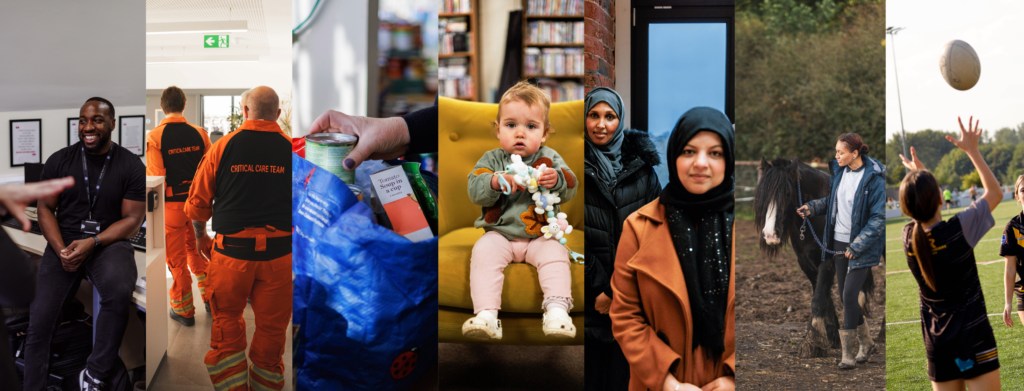
Freedom from renting: A YMCA CEO’s perspective on loan finance
YMCA Burton on Trent helps homeless young people to get their lives back on track. CEO Paul Laffey explains how buying their property has enabled them to make improvements to the building and develop their furniture strategy for the long term.
Tell us a little about YMCA Burton:
Our services range from providing emergency food parcels, operating an adult homeless service, providing a homeless outreach service, running a night shelter and delivering family mediation and counselling. The charity also runs four affordable furniture stores, one of which it purchased with the help of a £450,000 Charity Bank loan.
Why did you decide to buy your furniture shop, rather than continue renting?
It was the sensible thing to do. We had rented for a number of years and built a good relationship with our landlord, but rental property was in demand and our rent had increased.
The crunch point came when we realised the next increase was going to be pretty significant. Every penny we are putting into rent is income that we’re not investing in developing our services.
We talked to Charity Bank and it became clear that purchasing the shop made sound financial sense. We have ended up saving a lot of money on rent and there are benefits that come with owning our own assets.
What kind of benefits?
When we are seeking new funding certain investors wish to see that we have a good credit history, so being able to show that we always make our loan repayments is really helpful. Owning property is also proof that you have a long-term outlook, and it helps with planning for the future.
Have you done any work to the shop since buying it?
We have had a new roof and put solar panels on to generate more income. We have also had the whole building rewired. None of this would have happened if we had still been renting. The shop is a valuable asset, so we want to look after it and protect it for the future.
“We haven’t looked back, and we have no regrets about buying”
Have you had other large loans in the past?
It was our first major loan so a bit daunting, but it was another step forward for the charity and it feels like we’ve achieved a major milestone. We invested some of our reserves into the building to reduce the loan, but it was still a very big decision.
What did you do to ensure the trustees were comfortable about taking out a loan?
We carried out our own valuation on the building and had a building survey done. Basically, we did all the due diligence checks that are required when you’re buying a property. We had a couple of trustees with commercial backgrounds and they were able to use their expertise in meeting our requirements for good governance. It also helped that we had been renting the site for several years, so we had a full understanding about the income that could be generated.
Why did you choose Charity Bank for the loan?
We chose Charity Bank because they offered us the best terms. It was also really important that we found a lender who understood our ethos, values and understood the needs of our clients. Charities can be tricky to explain to high street banks, but Charity Bank knows the charity and voluntary sector very well. We didn’t have to work to explain how a charity works; they got it all immediately.
How did you find the process of applying for a loan?
It was a lengthy process, with lots of checks, which is understandable. But the hoops that we needed to go through were all ones we could manage. All in all, it wasn’t too cumbersome a process and it strengthened us as an organisation. That level of due diligence is good for any charity to go through. Having professional external scrutiny is something all charities should welcome.
What worked particularly well?
The relationship with Charity Bank was vital. We knew the regional manager previously as Charity Bank pop up at a number of charity events. The fact that Charity Bank clearly understood our needs was important. The team at Charity Bank are down to earth. They speak in terms that lay people understand and don’t blind you with financial jargon.
What would you say to other charities who are thinking about moving from renting to ownership?
Consider carefully your strategy. YMCA Burton haven’t looked back, and we have no regrets about purchasing this asset. It was a big step though, so I would encourage any charity to get the right professional advice.
Look at your long-term plan and weigh everything up carefully. For us, it was a financially sound decision, but it does depend on the charity and the property in question. Charity Bank want to ensure that you’re in a long-term position of affordability, so they don’t pressurise charities into a decision that isn’t right for you. They offer advice and guidance; there are no questions that you can’t ask them.
What’s next for YMCA Burton on Trent & District? Do you have any major projects coming up?
There’s loads happening; and we are continually looking to develop our services and develop new solutions. We are currently talking to Charity Bank about potentially purchasing other properties.
We have recently won a national award from The Garfield Weston Foundation. This will allow us to access a year-long coaching programme between YMCA Burton and a team of business leaders facilitated by another charity called Pilotlight.
It’s the YMCA’s 175th anniversary this year, so there are lots of celebrations going on within our local YMCAs, YMCA England & Wales and our Global network. The YMCA was founded in 1844 by George Williams and 175 years later we have more than 11,000 local associations across 127 countries.
“I like it when people we’ve supported come back to see us years later to tell us how we helped them get their lives back on track”
In the wider context, what changes would you like to see to support homeless charities?
Lots of things! I would like to see rented housing be more affordable for young people and families. Those on a low income shouldn’t have to put their life savings towards the upfront costs of getting the keys to their first home. We used to have a Government initiative called Supporting People – which released revenue funding for charities and housing associations who supported young people and families. YMCA and other charities did a fantastic job with this funding. Every £1 invested saved the government up to £7 with not having to invest in public services. I would like to see similar investment come back to homeless charities, particularly with the rise in homelessness.
I would also like to see more money put into preventing people from becoming homeless in the first place. Young people often find themselves entering the big wide world without the life skills required to maintain independent living. I would be very happy if the YMCA could be funded to run life skills workshops in every secondary school in the country. We are already engaged with 740 different communities.
More investment is also needed in mental health services. Too often young people cannot access professional support at a time when they are having a mental health crisis. There is so much I would love to see happen with collaboration and developing services in what is now a very complex world.
YMCA Burton runs 4 furniture shops, which are open 6 days a week and offer low cost and affordable white goods, furniture and essential household items.
About Charity Bank
Charity Bank is the loans and savings bank owned by and committed to supporting the social sector. Since 2002, we have used our savers’ money to make more than 1380 loans totalling over £580m to housing, education, social care, community and other social purpose organisations.
Nothing in this article constitutes an invitation to engage in investment activity nor is it advice or a recommendation and professional advice should be taken before any course of action is pursued.


